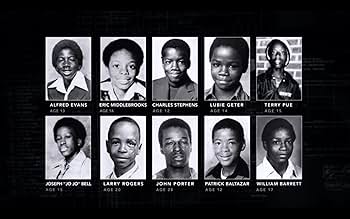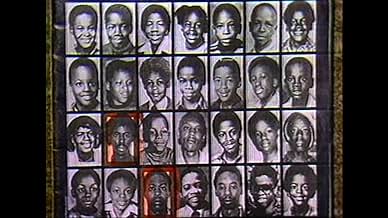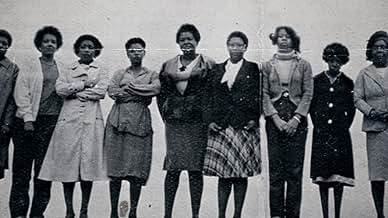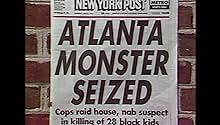Die Kindermorde von Atlanta
Originaltitel: Atlanta's Missing and Murdered: The Lost Children
- Miniserie
- 2020
- 1 Std.
IMDb-BEWERTUNG
7,1/10
1675
IHRE BEWERTUNG
Ein nie zuvor gezeigter Blick auf die Morde an mindestens 30 afroamerikanischen Kindern und jungen Erwachsenen, die sich über einen Zeitraum von zwei Jahren in der Hauptstadt von Georgia ere... Alles lesenEin nie zuvor gezeigter Blick auf die Morde an mindestens 30 afroamerikanischen Kindern und jungen Erwachsenen, die sich über einen Zeitraum von zwei Jahren in der Hauptstadt von Georgia ereigneten.Ein nie zuvor gezeigter Blick auf die Morde an mindestens 30 afroamerikanischen Kindern und jungen Erwachsenen, die sich über einen Zeitraum von zwei Jahren in der Hauptstadt von Georgia ereigneten.
- Auszeichnungen
- 2 Gewinne & 3 Nominierungen insgesamt
Folgen durchsuchen
Empfohlene Bewertungen
An important story and very detailed but the amount of crime scene and autopsy photos diminish rather than add to the storytelling. The victims were mainly children and that these photos were used and used so much it is as if it they were murdered again.
Normally, I hesitate at watching a true crime documentaries (we've all seen it) inside the mind of the killer type of deal where it's told from the perspective of the confirmed killer and then cut to the testimony of the people who grew up with him. Or the cliche reconstruction of the police investigation along with testimony from law enforcement personnel who worked those particular cases. Yes, the documentary minimally includes these elements mentioned above as a form of constructing context for the Child Murders that rocked the city of Atlanta in the late 70's to early 80's. But this documentary is far more compelling and bold in its storytelling than your typical standardized true crime 'crapola/junk'. The documentary does a magnificent job of not only depicting the horrifying nature of Atlanta's innocent children being murdered. But also manages to vividly illustrate to the viewer the historical and social factors (particularly the strong class divide that plagued the city especially it's African American communities) that caused the city of Atlanta to downplay the extent of the murders (as a manner of not scaring away economic investment) hence leading to more children being vulnerable to becoming a victim of targeted attacks. As seen in the documentary the city that was touted as being too busy to hate actually turned out to be the city that was too busy to properly investigate. Never forget the beautiful children that where taken way before their time in the city of Atlanta (1979-1981).
"Atlanta's Missing and Murdered: The Lost Children" (2020 release; 5 episodes of about 55 min. each) is a documentary mini-series about the slew of young black kids who were murdered or disappeared in Atlanta 40 years ago. As Episode 1 opens, it is "March 21, 2019", and Keisha Lance Bottoms, Mayor of Atlanta, and then Erika Shields, Atlanta Chief of Police, address the press, informing them and the public at large that they are reopening the investigations into the many unresolved cases, all of which took place between 1979 and 1981. We then go back in time, as we are introduced to Atlanta's background, becoming a mecca for blacks, and electing a black mayor for the first time in 1974. "Is the black mecca a myth or a reality?", asks the voice-over. It leads to the first case, when on July 28, 1979, two decomposed bodies are found in remote southwest Atlanta... At this point we are 10 minutes into Episode 1.
Couple of comments: as I didn't move to the US until 1983 (from Belgium), I was completely unaware and unfamiliar with this story. It absolutely blows the mind when you think about it: over a period of 23 months, 30 black kids (most of them in the 9 to 16 age range) met their demise or "were disappeared", and most of these cases were never resolved. Say what?!? Based on Episode 1, this series is a two-for-one: of course there is the question as to who committed these crimes (and why), but in a separate yet clearly parallel path, we look at the troubled history of racial tensions and the civil rights movement is Atlanta, the self-proclaimed "Empire City of the South" and "The City Too Busy To Hate". Of course the late 70s and early 80s are also a point in time when urban decay was at or near its peak, and we get to witness this as well, courtesy of the archive TV and film footage of that era. I can't wait to see the remaining episodes.
"Atlanta's Missing and Murdered: The Lost Children" premiered this weekend on HBO and is now available on HBO On Demand and other streaming services. New episodes air Sunday evenings at 8 pm Eastern. If you are a fan of true crime stories or of the underlying racial tensions that were (are?) found in big cities like Atlanta, I'd readily suggest you check this out and draw your own conclusion.
Couple of comments: as I didn't move to the US until 1983 (from Belgium), I was completely unaware and unfamiliar with this story. It absolutely blows the mind when you think about it: over a period of 23 months, 30 black kids (most of them in the 9 to 16 age range) met their demise or "were disappeared", and most of these cases were never resolved. Say what?!? Based on Episode 1, this series is a two-for-one: of course there is the question as to who committed these crimes (and why), but in a separate yet clearly parallel path, we look at the troubled history of racial tensions and the civil rights movement is Atlanta, the self-proclaimed "Empire City of the South" and "The City Too Busy To Hate". Of course the late 70s and early 80s are also a point in time when urban decay was at or near its peak, and we get to witness this as well, courtesy of the archive TV and film footage of that era. I can't wait to see the remaining episodes.
"Atlanta's Missing and Murdered: The Lost Children" premiered this weekend on HBO and is now available on HBO On Demand and other streaming services. New episodes air Sunday evenings at 8 pm Eastern. If you are a fan of true crime stories or of the underlying racial tensions that were (are?) found in big cities like Atlanta, I'd readily suggest you check this out and draw your own conclusion.
This is a documentary series about racism, not about true evidences or investigations. They don't even mention the DNA tests done in 2007, so I couldn't care less about their "hypothesis".
Unlike some others who have commented here, I think they kept most of their political biases out of this documentary for the first 4 episodes. But then came Episode 5, the final episode, which was as slanted an episode on the Atlanta Child Murders as could possibly be done. The last episode was almost completely shown through the prism of the defense, with maybe a minute or two of the prosecution side saying a few things. I wasn't living in the South at the time, but I was following this case when it was happening, and it's certainly a fascinating and very sad story. I said to my wife when this series started that if they want to prove that Wayne Williams didn't do all the murders, I could go along with that. But episode 5 tried to make the case that not only didn't Wayne Williams do any of these murders, but that it was most likely white people who killed all those black kids. Well, that just showed to me how this series was pure propaganda. I won't spend the time detailing this case in this review, but there are many, many reasons why Williams was convicted. And all these conspiracy theories about trying to prevent a race war and/or keeping Atlanta's image clean and wholesome were just ridiculous. Do the people who subscribe to these theories still think that OJ didn't do it too?
Wusstest du schon
- WissenswertesThe case of these murders was also the basis for the semi-fictionalized Mindhunter series (season 2, Netflix).
Top-Auswahl
Melde dich zum Bewerten an und greife auf die Watchlist für personalisierte Empfehlungen zu.
Details
- Erscheinungsdatum
- Herkunftsland
- Sprache
- Auch bekannt als
- Atlanta's Missing and Murdered: The Lost Children
- Produktionsfirmen
- Weitere beteiligte Unternehmen bei IMDbPro anzeigen
- Laufzeit
- 1 Std.(60 min)
- Farbe
Zu dieser Seite beitragen
Bearbeitung vorschlagen oder fehlenden Inhalt hinzufügen



































